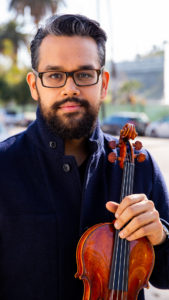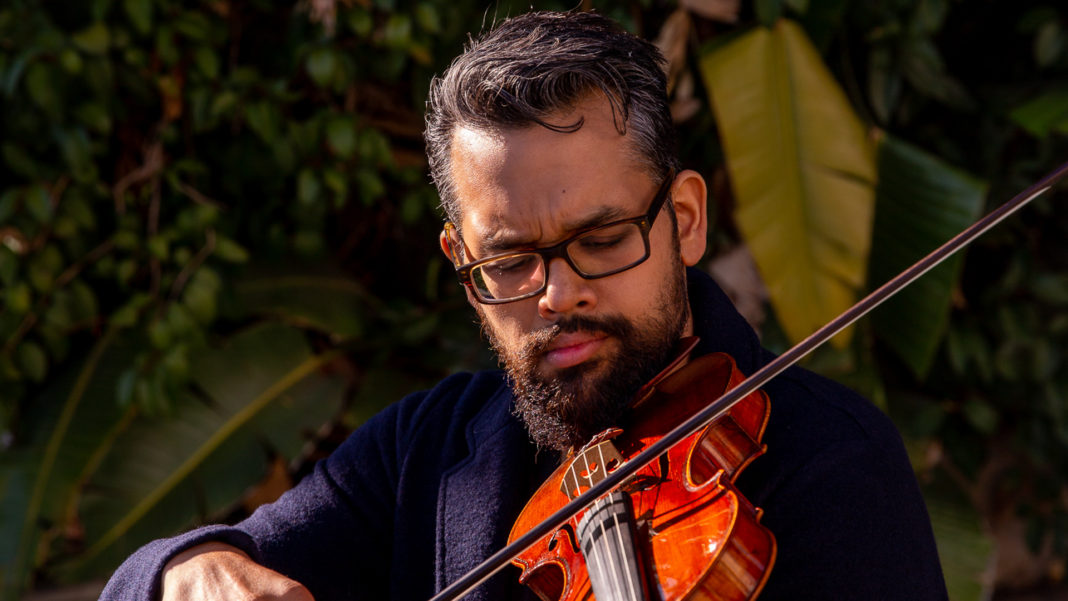One might wonder when looking at the title of the new album, When the Violin, what the rest of the title is. Violinist Vijay Gupta performs works by Johann Sebastian Bach, Reena Esmail and Esa-Pekka Salonen on the recording. Just the musician and his instrument. But when it what?
The title comes from a poem by 14th-century Sufi poet Hafiz. The full phrase is:
When
The violin
Can forgive the past
It starts singing.
Gupta, whom I first got to know when he was a member of the Los Angeles Philharmonic, certainly makes his instrument sing. He joined the orchestra as its youngest member when he was 19. In 2018 he received a MacArthur Fellowship.
In addition to being a gifted musician he’s also the founder and Artistic Director of Street Symphony, an organization that works with members of Los Angeles’s community that are often pushed to the margins of society: the homeless, the addicted and the incarcerated.
When we spoke last week via Zoom, I asked Gupta about the album, the art of listening and about music as an act of giving and receiving. What follows are excerpts from our conversation that have been edited for length and clarity. (If you want to see and hear the complete interview, please go to Cultural Attaché’s YouTube channel here.)
In the liner notes you wrote “In the music of my childhood, I found a key to reinvention.” You’re obviously referring to the work by Bach. At the time that you found that key to reinvention was that something you were looking for?
As a musician, as a violinist, I feel that every day I pick up the instrument is an opportunity to reinvent myself better. Better in the image of the instrument, which will always be better than me, better in the image of the composer’s living or recently dead or long dead, who are often also humbling figures in in one’s psyche.
I’m currently reading halfway through Paul Elie’s book Reinventing Bach, which is an incredible, incredible book about how Bach was constantly reinventing himself and how the players, the musicians who found themselves making Bach’s music, especially recording Bach’s music, found keys to reinvention for themselves and for the technology that they were using. So Albert Schweitzer for the LP and [Pablo] Casals and Glenn Gould and Yo-Yo [Ma] and so on and so forth. So I was particularly interested in reinventing myself in the image of Bach, who was reinventing himself three hundred years ago to the year in seventeen twenty when he wrote these six pieces for unaccompanied violin.
If you look at this album I would assume that there would be a lot of people who would have said this isn’t a path to success. So how important was it for you to take a risk and to define yourself by following your instincts as opposed to following the traditional path to success?
I think that for much of my life I have been incredibly lucky to have lived many different iterations of the traditional pathways of success. I won my first audition that I ever took for the Philharmonic when I was 19. I still don’t know how that happened. I was incredibly lucky to also see what traditional success looked like from the perspective of being in a Harvard neuroscience lab and seeing what the top scientists were studying. I think that whether we’re looking at neuroscience or traditional classical music and looking at the greatest soloists of the time, there is a sort of externally imposed assumption that that person has kind of fit into a niche and has risen exponentially because the niche exists.
I had to make this album because I had to make this album. And that is an incredibly vulnerable act, because as an artist, immediately one asks oneself, what is this just inherently narcissistic? Am I being selfish by imposing my will upon the most precious resource that any human being has, which is their time? But hopefully what any creative endeavor accomplishes is the ability to create a portal that mirrors, or a lens of one’s attention in time, to be able to give oneself a glimpse to say, you know what, I have the right to create something, too. I have a voice. I have something to say. We all have something to say. Whether we’re going to sit ourselves down and apply ourselves to the craft of creating, manifesting something from that capacity, is the work before us.
It feels like listening is an art form that is that is fast fading into a dying art form. And I’m wondering, as a musician who relies on people to listen, what your thoughts are or hopes that I’m wrong.

For me, listening is an act of love. And I am taught this every time I visit the community of people who have become a family to me in Skid Row. In fact, several years ago, there was a man named Brian Palmer, who I became quite close with. He was a member of a choir in Skid Row, and he was the one who said, “One act of love I know for sure is to listen.” Where we listen, how we place our attention in the world, is really where we direct the most precious resource we have: our time, our focus, our attention. You know, it’s not only that music and art are being commodified, but our very attention itself is the greatest commodity that everyone seems to be bidding for. And so listening to music, to even a track of the album, is something that I know I can never take for granted. Anyone who has taken the time to listen to this album has has given the most precious thing that they can possibly give. And I am incredibly honored and grateful that that has happened.
Hafiz wrote that “The heart is a thousand stringed instrument that can only be tuned with love.” How does your four-stringed instrument allow you not to just express love, but to receive it and through that have an impact on the world in which you live?
I recorded this album in a very special sanctuary here in Pasadena, where I live, at All Saints Church. Even though the church was empty I knew that I was in communion with something more than myself. When I entered that space, it wasn’t just about the acoustics, it was a kind of spiritual acoustic. When I played a note, it was not just an act of putting a note into the space, but using my ears to listen to how that space was giving something back to me. And in that moment of exchange and reciprocity is created in a mutual way such that I relax. I open. I’m more able to be vulnerable. And I kind of allow that heart to open up just wide enough so that it’s exposed six feet to the microphone that’s receiving what happens to be coming out of my instrument. So that point of mutual reciprocity and exchange makes playing music both an act of giving, but more importantly, an act of receiving, just as you’ve put it so beautifully.
All photos of Vijay Gupta by Kat Bawden (Courtesy Shuman Associates)
To see the complete interview with Vijay Gupta, please go to Cultural Attaché’s YouTube channel here.











